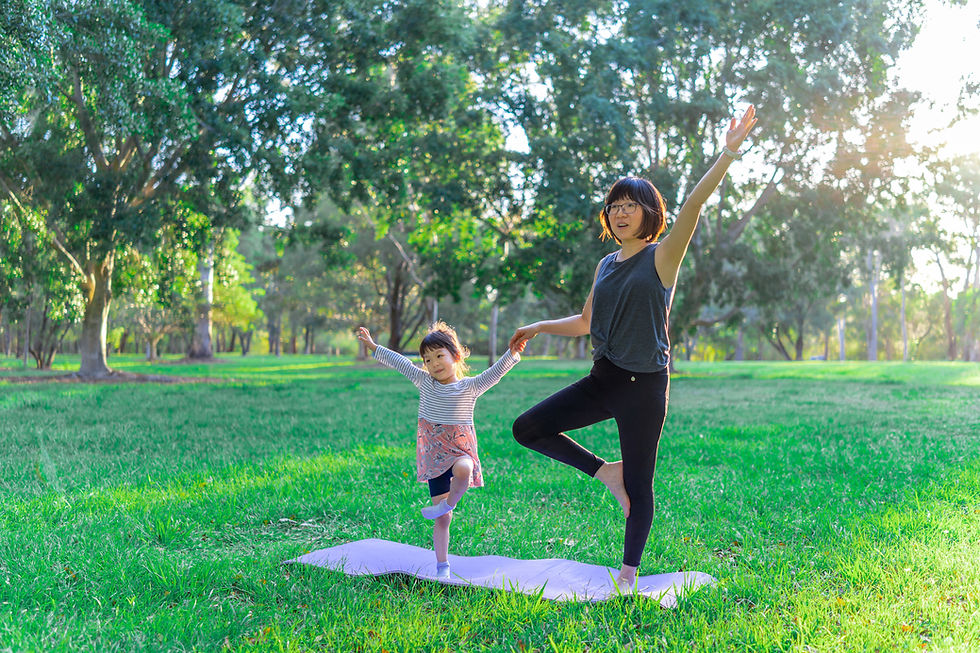Balance is an integral part of everyday function and activities, whether it be getting a mug from a high shelf or climbing the stairs. Unless a person has an issue with balance or has had a fall, it is very easy to forget about the importance of training balance.
Balance can be defined as the ability to maintain a stable and controlled position whilst performing various tasks.

Static vs Dynamic Balance
Static balance refers to your balance when standing or sitting without movement. An example of this could be standing still on a wobbly surface. In contrast, dynamic balance refers to balance when moving. This can include walking up the stairs or reaching down to grab an object off the floor.
Balance training is for everybody!
As noted earlier, balance is an important physical skill for all people regardless of age or health status. Older adults often require balance training as a way of preventing falls and maintaining their balance as they age. Children may require balance training as a way of dealing with the coordination deficits during growth or for improving their ability to play sport. Additionally, athletes such as netball players, golfers, dancers etc. need to train their balance to appropriately manage the balance demands of their sport.
Can Physiotherapy improve my balance?
Yes! Evidence supports the use of physiotherapy to improve balance. Training often includes a mixture of strength and balance exercises and has a great effect on reducing future falls and improving confidence.
Physiotherapists are able to assess different aspects of balance and come up with a tailored program to address the needs of the patient. Physiotherapists can also provide education on reducing falls risk.
Challenging Balance
To make meaningful improvements, balance training must be challenging for the individual. If the exercises are too easy, the body will not adapt and improve. As Physiotherapists, we encourage patients to challenge their balance to the point of failure, however, we emphasize that they must be in a safe environment to do so.
There are many ways that we can challenge balance such as:
Reaching further outside of your base of support
Changing the base of support (e.g. standing on one leg)
Changing the ground surface
Adding dual tasks (e.g. counting backwards or picking up objects)
Responding to perturbations (e.g. maintaining balance when being lightly pushed)
Removing visual stimulus
Physiotherapists are trained to progress and regress balance exercises based upon the individual so that you can be challenged in a safe and effective way.
How often do I need to train my balance?
Simply put, the more balance training you do, the more likely you are to improve. Evidence suggests that balance training should be undertaken at least 2-3 times weekly, with a total minimum weekly duration of 3 hours to see meaningful improvements. Whilst 3 hours may seem like a lot, it is important to remember that any amount of balance training can help you work towards better balance.
If you have any questions, have issues with falling or would like to improve your balance, please feel free to contact us for more information or to book an appointment with our Physiotherapists.
References:
1. Sherrington C, Fairhall NJ, Wallbank GK, et al. Exercise for preventing falls in older people living in the community: An abridged Cochrane systematic review. Br J Sports Med. 2020;54(15):885-891. doi:10.1136/bjsports-2019-101512 2. Chen P, Zhou X, Zhang Y, et al. A randomized controlled trial of a multifactorial fall prevention intervention for older adults in China. J Am Geriatr Soc. 2019;67(10):2102-2108. doi:10.1111/jgs.16018 3. Lam FMH, Liao LR, Kwok JYY, et al. Effects of exercise intervention on falls efficacy, activity of daily living and quality of life in older adults with falls-related self-efficacy decline: A randomized controlled trial. Age Ageing. 2018;47(6):869-875. doi:10.1093/ageing/afy110 4. Miyamoto ST, Lombardi Junior I, Berg KO, Ramos LR, Natour J. Brazilian version of the Berg balance scale. Braz J Med Biol Res. 2018;51(4):e6727. doi:10.1590/1414-431X20176727 5. Zou L, Yeung A, Li C, et al. Effects of mind-body exercises (Tai Chi/Yoga) on heart rate variability parameters and perceived stress: A systematic review with meta-analysis of randomized controlled trials. J Clin Med. 2018;7(11):404. doi:10.3390/jcm7110404



תגובות